10 Best Global Online Marketplaces to Sell Online
If you click to purchase a product or service based on our independent recommendations and impartial reviews, we may receive a commission. Learn more
When selling online, there are various places you can set up shop. While some merchants decide to build their own online store, others opt to sell their products via marketplaces.
Global online marketplaces are growing in popularity, both for merchants and customers, and as every good retailer knows, you need to sell where your customers are shopping.
The opportunities that come with selling through online marketplaces can be vast, so if you’re wondering whether an online marketplace is for you and which one(s) you should opt for, read this guide to find out.
What is an Online Marketplace?
An online marketplace is a platform that hosts various different products, from an array of different sellers, for customers to buy.
The two main features of an online marketplace are:
- Multiple different sellers who are all trading through the same platform.
- Customers can make a purchase without leaving the website or app.
Online marketplaces have become a mainstay of online shopping. Sites, such as Amazon, eBay, and Etsy, are perhaps the most popular examples of global online marketplaces.
Why Use Online Marketplaces?
Selling products via online marketplaces is a top choice for many merchants, and for good reason. There are various benefits to using an online marketplace including:
- A ready-made audience: Major online marketplaces such as Amazon and eBay already have huge audiences for you to sell your products to. Online marketplaces are particularly useful for small businesses because they can help you to grow your customer base, and acquire new leads.
- Increased brand awareness: If you list your products correctly and practice international SEO, your listings could be appearing in thousands of search results. Even if a user doesn’t click through to your product every time, just seeing your brand appear in the results will help to subconsciously boost your brand awareness.
- Customer trust: A key benefit of an online marketplace is trust. Major platforms, such as Amazon and eBay, have already built up trust with customers, making people feel more confident buying through them than with a retailer they’ve never heard of before.
Of course, you’ll also need to balance these benefits against other considerations, such as the commission rate you have to pay to your chosen marketplace, and the fact that you’re unlikely to have full control over the fulfillment process or customer experience.
10 Best Global Online Marketplaces
We’ve put together our 10 best global online marketplaces to help you determine which platform would best suit your ecommerce needs.
#1. Amazon
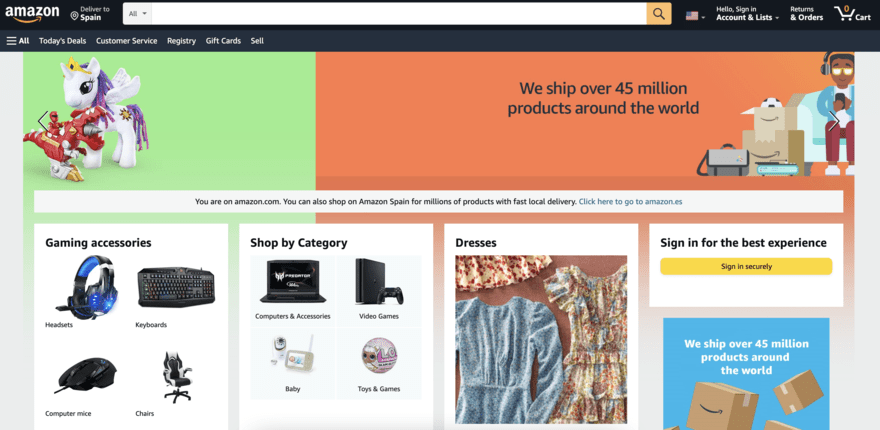
As one of the largest marketplaces in the world, it’s no surprise that Amazon continues to be a popular choice for retailers and customers alike.
Not only is Amazon a major online marketplace for buying and selling goods, but it’s also the second largest search engine on the internet.
Amazon offers an unrivaled shipping and fulfillment service, and can provide your brand with next-level visibility. Many large brands opted to launch on Amazon first, helping to build a loyal customer base before setting up a dedicated online store.
Amazon sells an array of products, and has categories covering everything: from home and garden products, to fashion, books, and beauty items.
If you decide to sell via Amazon, you’lll face commission fees on every sale you make, on average around 15%.
To set up your Amazon store, you’ll first need to register your brand in Amazon’s brand registry. After that, you can build your own Amazon store, selecting a theme and adding pages just like you would on a website builder.
Once Amazon has approved your store, you’re good to go!
#2. Etsy
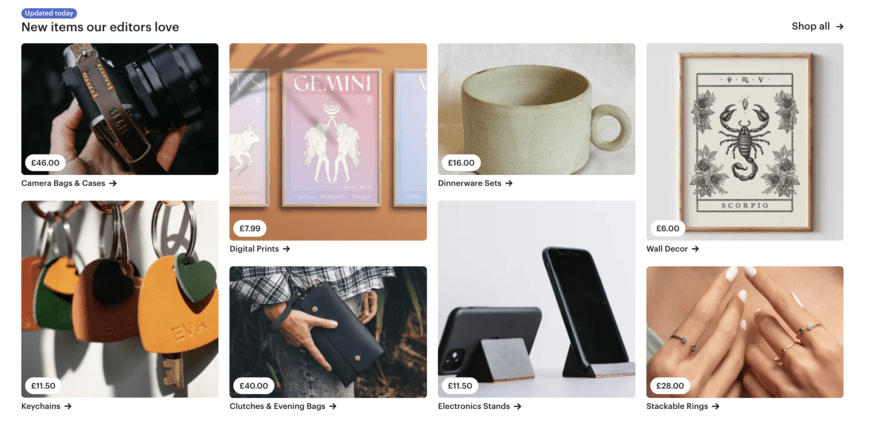
Etsy is an online marketplace that has grown in popularity over recent years, and mainly serves retailers in the arts and crafts market.
The platform hosts sellers who create and sell everything from vintage items to personalized products and collector items.
Etsy is different from other marketplaces in that often the items listed won’t be available to buy anywhere else online (except, perhaps, the seller’s own online store), making it a unique platform for both sellers and buyers.
If you decide that selling on Etsy is for you, it’s super simple to get started. You just have to set up an account and begin listing your items.
Like other marketplaces, you’ll have to pay a transaction fee on each sale of 6.5%, and you’ll also be met with a $0.20 listing fee per item that you list.
#3. eBay
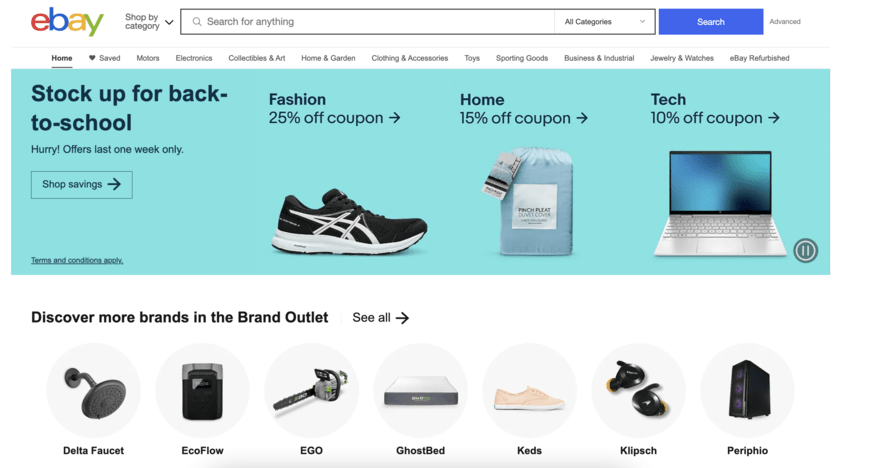
eBay was once thought of as just an online auction house for used items, and while it does still have this function, it’s grown into one of the biggest marketplaces in the world, selling items in almost every category imaginable.
There are various benefits to selling items on eBay. It’s the second largest marketplace in the US (only beaten by Amazon), and buyers don’t need to find your individual eBay store to make a purchase. They just need to see your listings in search results.
eBay also has a Global Shipping Program which allows you to hand over shipping to eBay, who will then distribute your product to over 60 million buyers worldwide.
The most important factor to consider when selling on eBay is price. As the marketplace is so large, the chances are there will be multiple sellers offering the same or very similar products. You, therefore, need to ensure your price is competitive to make you stand out.
When it comes to fees, eBay offers different pricing plans that come with various benefits, including listing boosts and reduced commission fees.
Learning how to sell on eBay is simple, you just need to sign up for a business account, set your account policies, such as shipping and returns, and then upload your inventory.
#4. Walmart
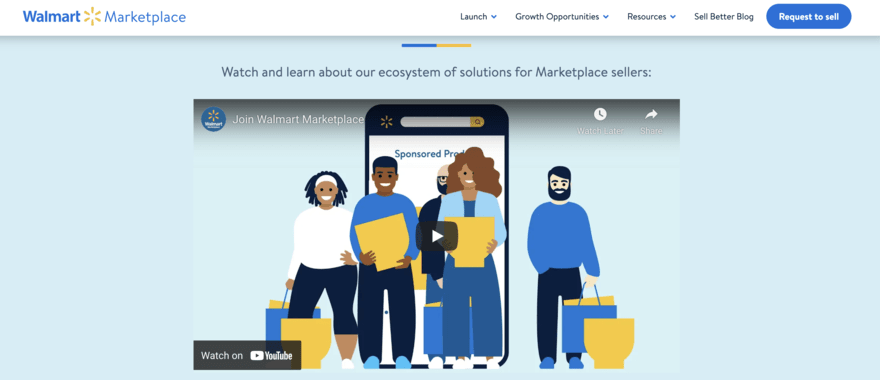
Walmart is an online store in its own right, but did you know it’s also an online marketplace?
Walmart allows third-party sellers to sell products on its site that span over 35 different product categories, including crafts, books, and computers.
You don’t need to be based in the US to make use of this either – 5% of Walmart third-party sellers are currently based elsewhere, making this a great option for international merchants targeting a US audience.
Walmart also has six distribution centers across the country, and has committed to meeting two-day delivery expectations for almost all orders.
A big bonus to selling your products via Walmart is the reputation and trust that the brand name has already built up. This is particularly good for new businesses that are yet to build the same levels of customer loyalty.
To sell on Walmart as one of its third-party partners, you’ll need to undertake the application process, telling them about your shop and the products you want to sell. Once approved you can set up your seller account and add your items.
Walmart will conduct one final review before approving you for active sales.
If you have a Shopify store you can also connect this with Walmart’s marketplace, allowing you to sync your inventory and import order details for fulfillment.
#5. Mercado Libre
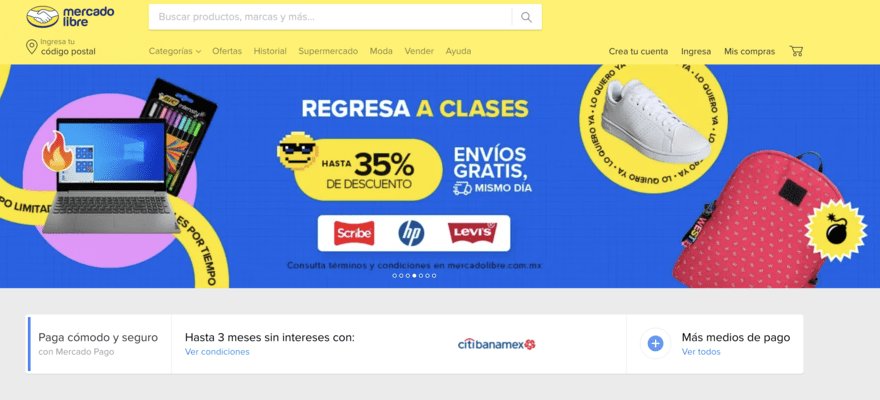
Mercado Libre is a huge online marketplace based in Mexico.
Since its beginning back in 1999, Mercado Libre has become Amazon’s biggest competitor in Mexico. So, if you’re interested in reaching an audience here, it’s definitely one to consider.
Mercado Libre has over 150 product categories, so the chances are, there will be an audience for your items. The marketplace gains around 650 million visits per month, and top product categories include sports equipment, electronics, and fashion.
In order to start selling on Mercado Libre, you’ll need to be accepted into its global seller’s program. A key benefit for US sellers is that international merchants are able to list and collect payments in their chosen currency.
#6. Shopee
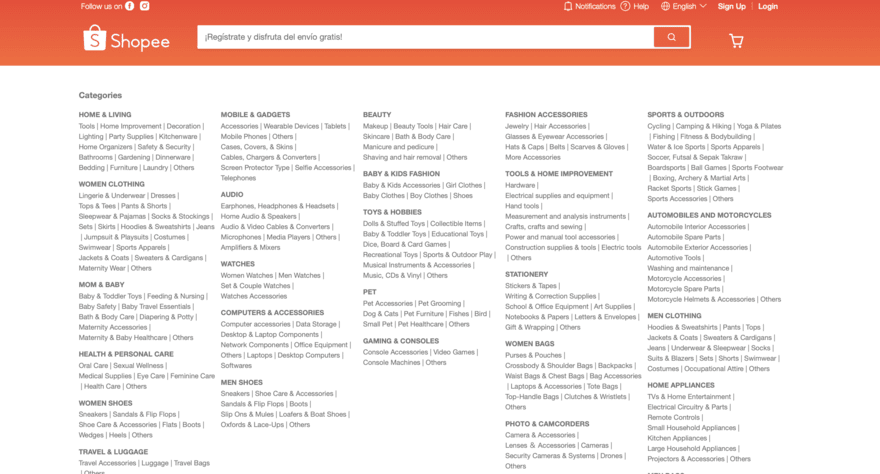
Shopee is an online marketplace based in Malaysia and welcomes over 50 million monthly visitors.
A massive perk of Shopee is that listing on the marketplace is free and retailers with less than 100 completed orders are also exempt from paying commission fees.
Sellers also love Shopee as it allows you to use multiple payment methods, including debit and credit cards, ATM transfers, and cash on delivery.
You don’t need to worry about order fulfillment either thanks to Shopee’s multiple fulfillment centers, located in SouthEast Asia, that will take care of receiving and shipping your orders to customers.
#7. Flipkart
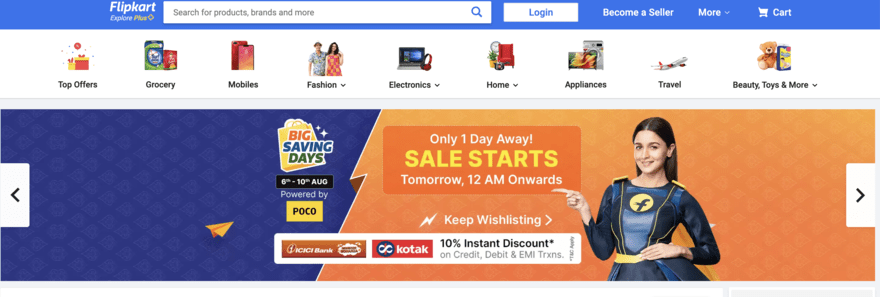
Flipkart is one of India’s biggest online marketplaces. In fact, the online store generated $4.6 billion in revenue in October 2021 alone!
Originally the platform was an online bookstore, but it’s now expanded to offer other categories, including furniture, groceries, and clothing.
Flipkart allows you to set up a merchant profile for free and its interface is easy to use for all abilities, allowing you to focus on getting your products in front of a potential 200 million users.
Its seller protection program also means you’ll be insured should anything go wrong, and the marketplace has one of the best global fulfillment networks. With over 10,000 delivery agents and 200+ pick-up hubs, you don’t need to worry about how you’ll ship your products internationally.
#8. Fruugo
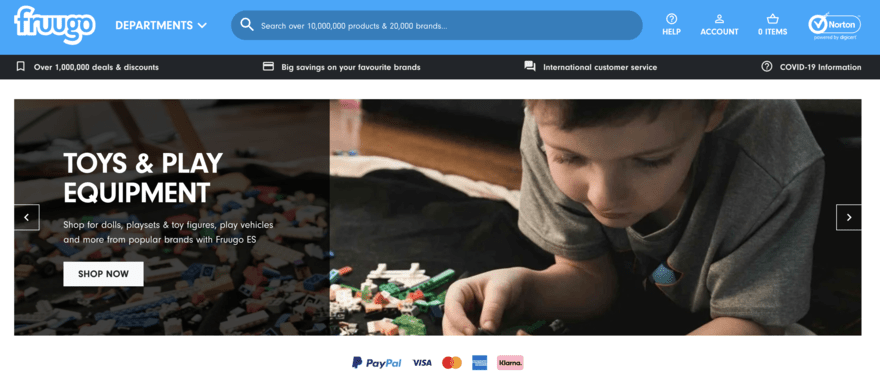
Fruugo is a global online marketplace that operates in more than 50 countries, covering the majority of Europe and Asia.
A key benefit to this international marketplace is that it provides a translation service, translating product listings into over 25 different languages.
You also don’t have to pay a monthly fee to use the platform, which some global marketplaces require. Instead, you’ll just pay a commission every time you make a sale.
Fruugo is based in the UK and allows sellers to be paid in their own currency, and it has various beneficial features, including help for managing VAT.
#9. AliExpress
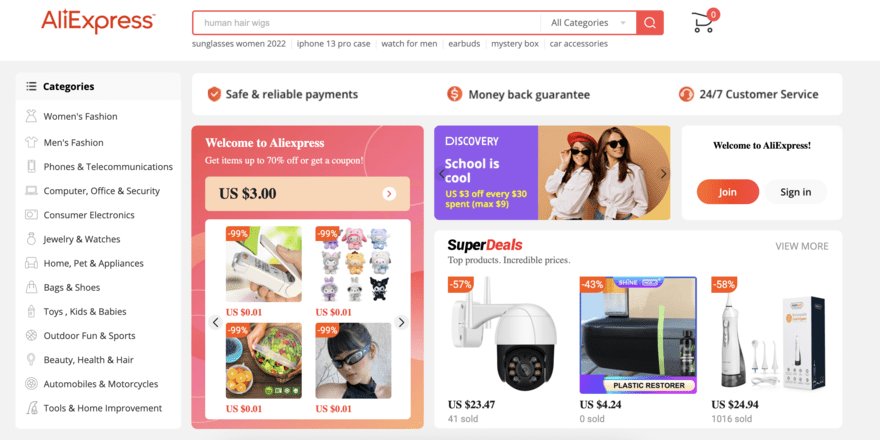
Based in China, AliExpress serves more than 230 countries and regions making this a truly global online marketplace.
Fees are famously low for sellers on AliExpress and, depending on your product category, you could be paying just 5-8% of your total sales.
AliExpress is also known for its great customer experience and service, which means you can rest assured that your customers are well taken care of and inquiries are handled quickly.
You’ll also receive your payment as soon as your customer receives their shipment.
Advice from the Experts
Top Tip: AliExpress is an incredibly popular marketplace on “Singles Day”, China’s equivalent to Black Friday.
#10. Cdiscount
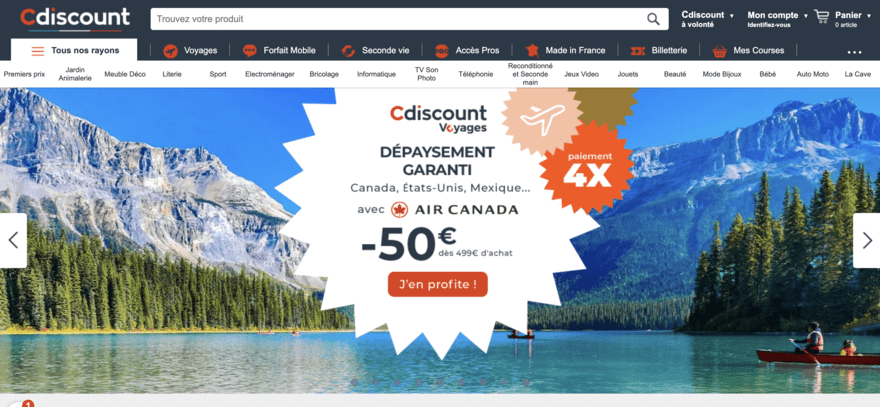
Cdiscount is a fast-growing online marketplace based in France.
It has around 10 million active customers and allows retailers to create their own shopfront with no opening costs and no sales limit.
There’s no limit on the number of products you can list either, and Cdiscount allows you to sell both new and used items.
If you’re aiming to expand your ecommerce business into France then Cdiscount is a great option.
It offers an on-demand fulfillment service where you simply deliver items to its warehouse once the customer has placed an order. They will then take care of the rest, shipping your order out within 24 hours.
How to Pick The Best Marketplace For You
Now you’ve got the lowdown on our top 10 global online marketplaces, you need to decide which one is right for you.
When it comes to choosing an online marketplace to sell your products, some things to think about include:
- Do you need a specialist marketplace aimed at selling specific products? For example, Etsy is a great option for sellers who want to sell homemade or crafted items.
- Calculate the fees you’ll need to pay for each marketplace. You’ll need to work these into your overall budget to figure out what you can afford.
- Assess the global reach of your chosen marketplace. Does it target the right country for you and how high are the conversion rates?
- Does the marketplace provide fulfillment support? This is essential for most merchants, especially if you’re targeting an international audience.
Tips For Selling on Online Marketplaces
If you’ve chosen your online marketplace, and you feel ready to start listing and selling your products, make sure you check out our top tips for selling on online marketplaces below.
- Always account for fees when setting the price of your item to ensure you protect your profits as best you can.
- Take high-quality product photos to make sure your listing stands out.
- Write well-researched and accurate listing titles and descriptions. We have a whole article on how to write product descriptions to help you out.
- Consider providing translations for international audiences if your chosen marketplace doesn’t do this for you.
- If you have the budget, use paid advertising to boost your listings and drive traffic to your shop front. You can do this internally on the marketplace via sponsored products, or externally with a PPC campaign.
- Develop a strong customer relationship strategy. Think about how you can keep the customer within your ecosystem for longer and ensure you’re providing excellent customer service.
Best Global Online Marketplaces: Summary
Selling your products via a global online marketplace can result in major ecommerce success, but that doesn’t mean it’s going to come easy.
In today’s world of online shopping, there’s a lot of noise and competition out there, but if you manage to find the online marketplace that’s right for you, you could be reaching an audience of millions.
To recap, our top 10 global online marketplaces are:
- Amazon
- Etsy
- eBay
- Walmart
- Mercado Libre
- Shopee
- Flipkart
- Fruugo
- AliExpress
- Cdiscount
Don’t forget, if you try out a marketplace and don’t get the results you were hoping for, you can always swap to a different one!
Be sure to let us know in the comments which marketplace you decide is the right one for your ecommerce business.

2 comments